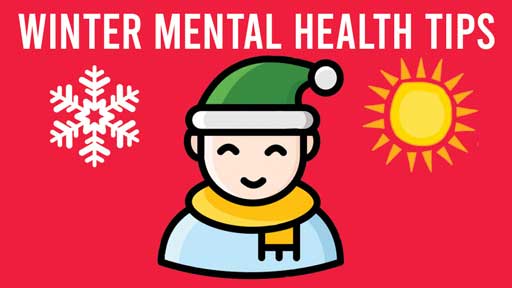The Winter Solstice recently occurred on December 21st, giving us the “shortest” day of the year when accounting for the amount of time the sun is up. While we may not be anywhere near out of the thick of the Minnesota winters, the days will slowly start to get longer now that the solstice is behind us.
Still, these cold and dark days of winter tend to have an impact on our mental health.
Why do we feel this way?
Dr. Dominic Wu discussed the impact the season change can have on us in an article for Harvard Health. Our bodies are controlled by a circadian rhythm that regulates important functions in our body such as when we sleep and eat (something Eric Greene, CNP has discussed previously).
The changes in the duration of sunlight can negatively impact our circadian rhythm which struggles to keep us pushing forward late in the day when the lack of sunlight makes us feel like the day is already over. Dr. Wu also points out that genetics and body chemistry can impact how strongly this feeling bothers us.
What can we do about it?
- Take vitamin supplements – With the decreased amount of sunlight, you may find yourself low on vitamin D. This can be replaced through vitamin D supplements which are some of the most popular supplements we sell at Integracare during the winter months.
- Drink herbal teas – Many of these teas can ease depression and calm your nerves.
- Go to bed earlier – Naturally the decrease in sunlight results in your body craving going to bed earlier. Getting more sleep during the winter months can help you stay healthier overall.
- Maintain an exercise schedule – While the holiday season may make eating healthy a challenge it is important to keep diet and exercise at the top of mind. Regular exercise can release endorphins and thus improve your mood.
Seasonal Affective Disorder (SAD)
Those that deal with frequent bad moods during the winter months may need to consult a medical professional. The type of depression known as Seasonal Affective Disorder (abbreviated “SAD”) is a diagnosis that is sometimes associated with this type of behavior.
According to the Mayo Clinic, “if you’re like most people with SAD, your symptoms start in the fall and continue into the winter months, sapping your energy and making you feel moody.” A minority amount of patients also experience the opposite, with their symptoms starting in the late spring or early summer.
While we all feel down from time to time, if the seasonal changes are consistently impacting your mood, sleep or diet, consider consulting a medical professional.


